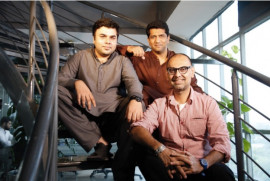
The two-hour ride became a ritual of Yuri Hamasaki’s childhood. “All I could do was pray and hope that everything was going to be okay.”
Her mother. studying to become a nurse to help the family, became a role model. Books on Florence Nightingale, considered the founder of modern nursing, became a passion. Now Yuri has connected the dots and wants to help others as the country manager for diet and healthcare app Noom.
Balance
The term salaryman in Japan evokes images of predominantly male workers putting in ridiculous hours, going for drinks after work, and passing out on the way home from exhaustion.
Fintech startup raises $1m seed capital to scale mobile wallets in Pakistan
Yuri jumped right into that world.
“I had a sales title but I was doing so many different things,” Yuri reflects on her first job. “I was working with engineers until 6:00 am trying to get a release out. Then I would take a shower and go back to work at 9:00 am.”
Yuri was struggling to find balance. She ended up gaining 13 kilograms out of college. After a few years she jumped ship and joined the gaming company Gree.
Structure
I joined right before it really took off. There were around 400 people at the time.”
Yuri discovered the importance of management and data. “We were using numbers and money to really break down decisions logically when deciding how to grow the company.” There was a strong focus on product but the company was experiencing extreme growing pains. “The growth of knowledge was not keeping up with the people.”
After a year and a half, sales started to go down.
“People’s attitudes changed. It was getting really dark,” Yuri reflects. “I learned that using the same patterns of success won’t always work in the future.” She wanted to have a greater impact and looked to education next.
Korean startup clones Pokemon Go – but for little kids
Hustle
Benesse is one of Japan’s largest education companies with a market cap of nearly US$2.5 billion. While Yuri was also looking forward to working at a big company, she ended up focusing on new business creation, particularly researching and meeting edtech startups. That’s when entrepreneurship started to rub off on her.
Yuri heard from the startup scene that Noom would be visiting Tokyo.
“I was using Noom and other apps at that time and I realised that exercising and being healthy also had a great effect on my emotional well-being.” She had the chance to meet with the CEO, Korean serial entrepreneur Saeju Jeong, and other team members.
“We were drinking some wine, it was very casual. It felt great. We had a good conversation and connected.” A few months later Noom was ready to expand into Japan and Yuri’s name came to the top of the list.
“I didn’t hesitate at all. I knew this was for me.”
Localise
Yuri’s dots have finally connected and she is using all of her experiences to help Noom break into the Japanese market.
“So many things that worked in America will not work here,” she says. The culture of fitness is completely different. “The meaning of diet as a word in Japan is more about losing a lot of weight in a short amount of time. It’s not about exercising – it’s about limiting how much you eat.”
Noom’s new 16-week program focuses on the social aspect of motivation to get users moving. Similar users are placed in groups together with a coach. In addition to one-on-one advice, coaches also post daily challenges, quizzes, and health lessons into the group chat.
Pakistani startup challenges menace of fake drugs
“Humans are more motivated when they see people around them excelling at the same pace,” says Yuri.
Yuri says that over 70 percent of the people in Noom are participating in groups. Without user numbers though, it’s hard to tell how much ground the US company has made on local competitor Finc, which has raised an apparently large amount of money that included a contribution from Yuri’s old company, Gree.
However, the distribution deal Yuri scored yesterday with one of Japan’s strongest sales companies, Recruit and its health, wellness, and beauty subsidiary Recruit Lifestyle is likely to have a big impact.
Although large corporations are notoriously difficult to work with as a startup in Japan, Noom helped 75 Recruit employees lose an average of 2.8 kilograms each in a trial program last year, which definitely got the giant’s attention. Yuri hopes the two companies can be a model for how big corporations and startups can collaborate together.
“I hope we can change the idea that a diet is just a one-time thing. That exercise can be used to refresh. We want people to lead and design healthy lives.”
This article originally appeared on Tech in Asia.
































1714024018-0/ModiLara-(1)1714024018-0-270x192.webp)










COMMENTS
Comments are moderated and generally will be posted if they are on-topic and not abusive.
For more information, please see our Comments FAQ